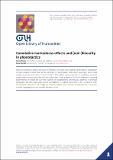Cumulative markedness effects and (non-)linearity in phonotactics
Author(s)
Breiss, Canaan; Albright, Adam
DownloadPublished version (1.773Mb)
Publisher with Creative Commons License
Publisher with Creative Commons License
Creative Commons Attribution
Terms of use
Metadata
Show full item recordAbstract
<jats:p>How do grammars assess the well-formedness of words with multiple phonotactic violations? Certain models predict that as the strength of phonotactic restrictions decrease, forms that violate multiple restrictions should be less acceptable than expected, in a pattern we term super-linear cumulativity. We test this prediction using a series of Artificial Grammar Learning experiments, in which we vary the number of exceptions to phonotactic patterns in artificial languages. We find that super-linear cumulativity is indeed observed in the conditions with the weakest restrictions. Strikingly, participants exhibit super-linear cumulativity even when the trained language does not contain evidence for it.</jats:p>
Date issued
2022-04-12Department
Massachusetts Institute of Technology. Department of Linguistics and PhilosophyJournal
Glossa: a journal of general linguistics
Publisher
Open Library of the Humanities
Citation
Breiss, Canaan and Albright, Adam. 2022. "Cumulative markedness effects and (non-)linearity in phonotactics." Glossa: a journal of general linguistics, 7 (1).
Version: Final published version